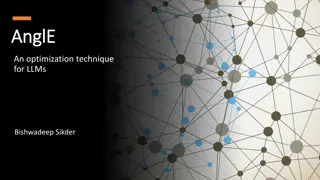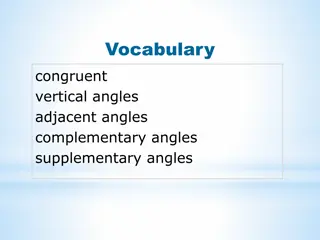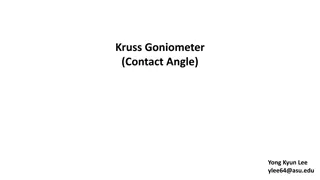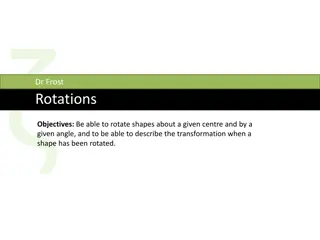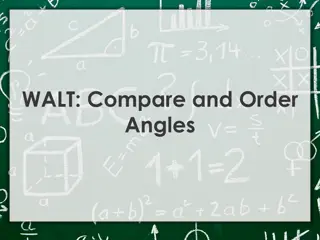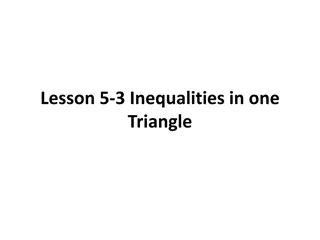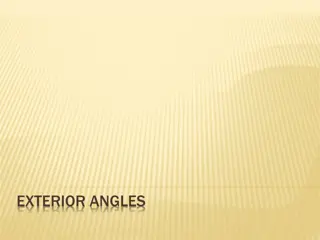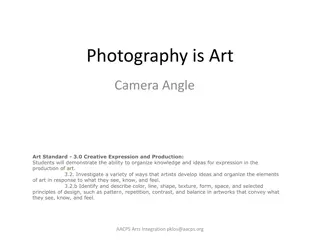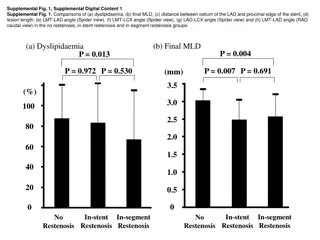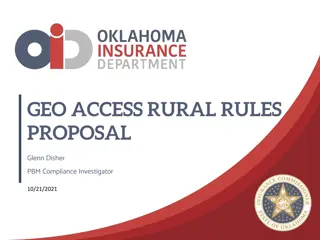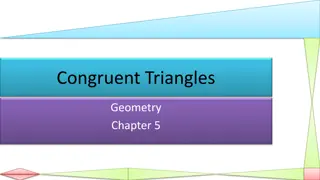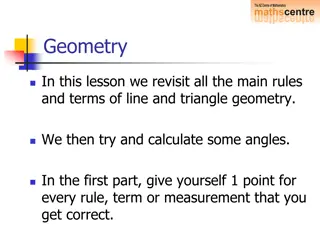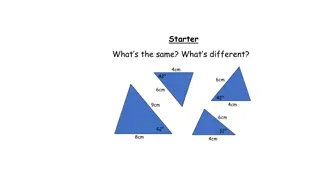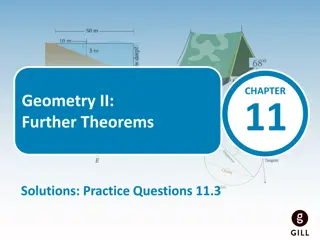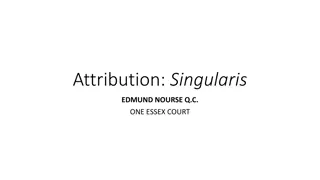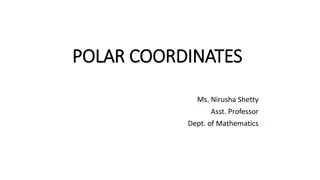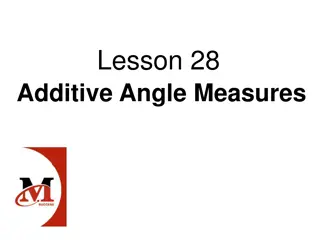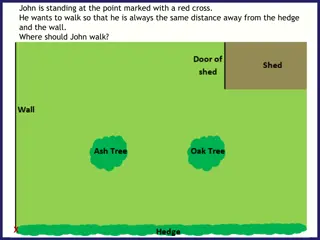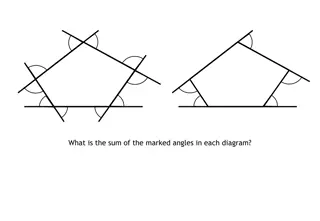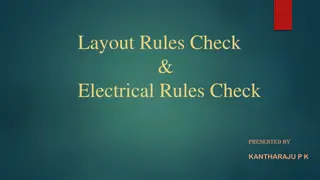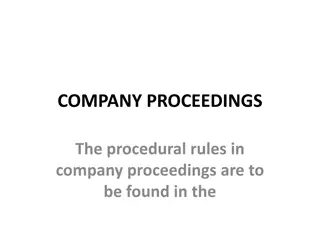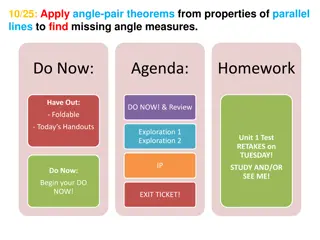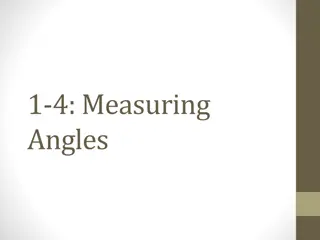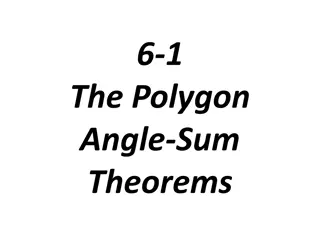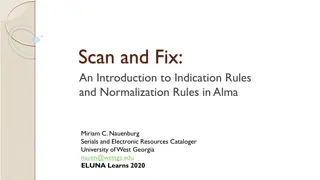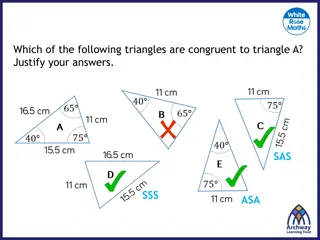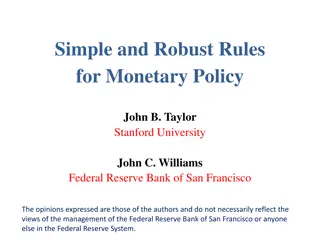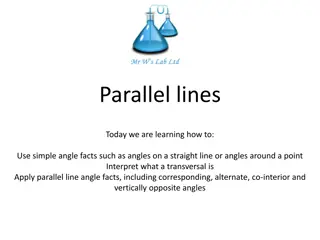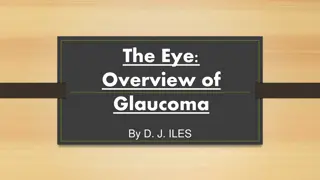AnglE: An Optimization Technique for LLMs by Bishwadeep Sikder
The AnglE model introduces angle optimization to address common challenges like vanishing gradients and underutilization of supervised negatives in Large Language Models (LLMs). By enhancing the gradient and optimization processes, this novel approach improves text embedding learning effectiveness.
9 views • 33 slides
Solving right triangles
Discover how to solve right triangles using trigonometric ratios and angle measures. Explore examples and real-world applications, such as calculating street grades in San Francisco. Learn how to identify angles using sine, cosine, and tangent ratios, and use inverse trigonometric functions to find
0 views • 26 slides
Understanding Prism Terminology and Light Deviation
Prisms are optical devices that deviate light without changing its vergence. This module explores the various terminology associated with prisms, including Apex, Base, Refracting Angle, and Angle of Deviation. The passage of light through a prism follows Snell's Law, where the ray is deviated toward
4 views • 42 slides
Understanding Fresnel Prisms: Advantages, Disadvantages, and Applications
Fresnel prisms, a type of prism where the angle of refraction only depends on the surface angle and material's refractive index, offer advantages such as thinness, lightweight, and flexibility but have disadvantages like cosmetic differences and reduced visual performance. They find applications in
11 views • 24 slides
Understanding Angle Relationships in Geometry
Explore key geometry vocabulary such as congruent, vertical, adjacent, complementary, and supplementary angles. Learn how to identify different types of angle pairs and calculate unknown angle measures using angle relationships. Visual examples and explanations enhance understanding.
1 views • 19 slides
Step-by-Step Guide for Using Kruss Goniometer Contact Angle Analyzer
Detailed instructions on how to operate a Kruss goniometer contact angle analyzer. Learn how to set up the equipment, prepare the sample, adjust camera focus, measure contact angle, and analyze the results. Follow each step carefully to achieve accurate measurements.
1 views • 10 slides
Comparative Analysis of Glaucoma Management Practices in Uganda and the UK
Glaucoma, the 3rd leading cause of blindness in Uganda, is primarily managed by General Ophthalmologists across 20 hospitals in the country. Uganda lacks Glaucoma subspecialists and specialized nurses. Equipment availability varies among hospitals. Cases in Uganda are typically identified through re
0 views • 13 slides
Understanding Rotations in Geometry
Learn how to rotate shapes around a center by a specified angle and describe the resulting transformation. Explore concepts like center of rotation, angle, and sense of rotation. Practice rotations with various examples and understand the process step by step.
2 views • 10 slides
Understanding and Comparing Angles in Mathematics
In this educational material, students will learn to differentiate between acute, right, and obtuse angles. They will practice identifying angles, ordering them from smallest to largest, and determining angles within various shapes. The content also includes reasoning exercises to enhance understand
1 views • 16 slides
Trigonometric Problems: Mixed, Sine and Cosine Rules
This strand delves into trigonometric problems focusing on triangles with mixed information, exploring side lengths and angle measurements beyond right-angled triangles. It covers mixed problems, sine and cosine rules, applying area of any triangle, and Heron's formula. Engage in various exercises i
0 views • 28 slides
Understanding Triangle Inequalities and Angle-Side Relationships
Explore the Vocabulary of Exterior Angle Inequality Theorem, Angle-Side Relationship Theorems 5.9 and 5.10. Understand how to order triangel angle measures and side lengths from smallest to largest through examples. Discover the principles governing triangles in terms of angles and side lengths.
0 views • 12 slides
Understanding Exterior Angles in Polygons
This content explains the concept of exterior angles in polygons and the Exterior Angle Theorem. It covers how exterior angles are formed when the sides of a polygon are extended, their relationship with interior angles, and how to calculate their measures using the Exterior Angle Theorem. Various e
2 views • 26 slides
Enhancing Rowing Performance with Advanced Feedback Systems
Explore the EmPower Oarlock and SpeedCoach GPS systems for rowing, providing real-time feedback on stroke metrics like length, blade engagement, and force. Customize your display with various metrics and receive technical feedback on improving catch angle, finish angle, blade engagement, and more. E
0 views • 11 slides
Financial and Eligibility Rules for EU Cooperation Programmes
Financial and eligibility rules for EU cooperation programmes include details on the first-level control unit, sources of information, hierarchy of rules, overarching eligibility rules, and reporting overview. These rules cover areas such as project activities, expenditure eligibility, procurement r
2 views • 27 slides
Exploring Camera Angles in Photography
Photography is a form of art that involves various creative expressions, including the use of different camera angles to capture unique perspectives. This content explores different camera angles such as high-angle shot, low-angle shot, Dutch angle, and straight angle, each offering a distinct visua
1 views • 7 slides
Comparisons of Dyslipidaemia and Lesion Characteristics in Restenosis Groups
This supplemental content presents comparisons of dyslipidaemia, final minimal luminal diameter (MLD), distance between ostium of the LAD and proximal edge of the stent, lesion length, and various angle measurements in different restenosis groups. The findings highlight significant differences in dy
0 views • 4 slides
Rural Access Compliance Rules Proposal by Glenn Disher - PBM Investigator
Proposal by Glenn Disher, a PBM Compliance Investigator, outlines rules for rural access compliance. The proposal focuses on considering local conditions and enforcing rules for maximum impact. It includes recommendations for zip code rules, compliance mileage rules, and examples of non-compliant ru
0 views • 7 slides
Threat Analysis and Mitigation Strategies for Impact Event: Briefing Summary
This briefing delves into the potential physical and infrastructure effects of an impact event with an asteroid of up to 400 meters in diameter, traveling at a speed of 16 km/s. The simulation highlights the significant threat of tsunamis resulting from such an impact, with tsunami strength varying
0 views • 5 slides
Choosing the Right Hockey Stick: Understanding Lies, Flex, and Curves
When purchasing a hockey stick, it goes beyond just color or brand name. Understanding factors like lie angle, flex, and curve pattern is crucial for optimal performance. The lie angle determines how much blade is on the ice, impacting handling and shooting. Flex and length also play key roles in fi
0 views • 13 slides
Understanding Triangles: Classifying by Sides and Angles
Delve into the world of triangles in geometry with a focus on classifying them by their sides and angles. Learn about equilateral, scalene, and isosceles triangles based on side lengths, and explore equiangular, right, acute, and obtuse triangles according to angle measurements. Uncover the Triangle
0 views • 60 slides
Mastering Line and Triangle Geometry: Rules and Angle Calculations
Revisit the main rules and terms of line and triangle geometry to calculate angles. Understand types of angles, such as right, acute, obtuse, and reflex. Learn about various angle rules like angles on a straight line, angles at a point, vertically opposite angles, angles in a triangle, equilateral t
0 views • 46 slides
Understanding Triangle Congruence Properties
Delve into the principles of congruent triangles by exploring the properties of side-side-side (SSS), side-angle-side (SAS), angle-side-angle (ASA), and right-angle-hypotenuse-side (RHS) congruence. Visual explanations help clarify how these properties determine if triangles are congruent.
0 views • 18 slides
Understanding Perpendicular and Angle Bisectors in Geometry
Explore the concepts of perpendicular and angle bisectors in triangles through visuals and theorems. Learn how to identify, utilize, and apply these bisectors to solve problems involving segments and angles within triangles. Enhance your understanding of bisectors with examples and step-by-step expl
0 views • 46 slides
Geometry Practice Questions: Triangles Similarity Theorems
Explore practice questions demonstrating the similarity of triangles based on angle relationships. Understand how to prove similarity using given angle measurements in various triangle configurations. Delve into the concept of similar triangles through visual examples and step-by-step solutions.
0 views • 34 slides
Understanding Company Attribution Rules in Legal Proceedings
Company attribution rules in legal proceedings are outlined, focusing on primary rules found in a company's constitution, general principles of agency, and exceptions where traditional attribution methods may not apply. The interpretation of laws involving companies and the application of specific a
0 views • 7 slides
Understanding Polar Coordinates in Mathematics
Polar coordinates define the location of a point in terms of distance and angle from an origin. The distance is denoted by "r" and the angle by "?". However, the angle is not unique for a point. The concept involves fixing an origin and an initial ray, with positive angles measured counterclockwise.
0 views • 7 slides
Understanding Additive Angle Measures
In this lesson on additive angle measures, students learn how to find missing angle measures when two non-overlapping angles combine to form a larger angle. Essential questions are posed, and students are guided through solving problems involving angle decomposition and measurement. Practical activi
0 views • 46 slides
Exploring concepts of equidistance and angle bisector in geometry
Explore the concepts of equidistance and angle bisectors in geometry through practical examples like determining the path for John to walk equidistant from a hedge and a wall, understanding the ideal flight path for a plane to land, constructing angle bisectors, and verifying constructions for accur
0 views • 23 slides
Geometry Angle Sum and Properties Exploration
Dive into the world of geometry with various diagrams and scenarios focusing on angle sums, concave and convex polygons, and angle measurements. Learn about properties of polygons and test your skills in identifying different shapes and their classifications based on their properties. Explore angles
0 views • 18 slides
Layout and Electrical Rules Check by KANTHARAJU P.K.
Layout rules check is essential in preparing masks for fabrication processes to ensure accuracy. Key design rules include minimum width, spacing, enclosure, and extension. Electrical rules checking (ERC) methodology is used to verify design robustness against electronic design rules at schematic and
0 views • 15 slides
Understanding Procedural Rules in Company Proceedings
Procedural rules governing company proceedings can be found in the Companies Proceeding Rules, Companies Winding-Up Rules, and the Federal High Court (Civil Procedure) Rules. These rules dictate the process for applications, such as Originating Summons, Originating Motion, or Petition under CAMA. Th
0 views • 22 slides
Understanding Angle Pair Theorems in Geometry
Explore the application of angle-pair theorems in finding missing angle measures using properties of parallel lines. Learn about different types of angle pairs such as vertical angles, corresponding angles, same-side interior angles, alternate exterior angles, and more through engaging activities an
0 views • 14 slides
Understanding Angles: Definitions, Examples, and Postulates
Explore the world of angles with definitions of angle parts, types of angles, angle pairs, Angle Addition Postulate, and more. Dive into examples and classwork exercises to enhance your understanding of angles in geometry.
0 views • 16 slides
Understanding Angle Pair Theorems in Geometry
Learn how to apply angle pair theorems using properties of parallel lines to find missing angle measures. Explore concepts like corresponding angles, alternate interior angles, alternate exterior angles, and consecutive interior angles through visual aids and practice problems.
0 views • 14 slides
Understanding Polygon Angle-Sum Theorems
Explore the Polygon Angle-Sum Theorems that determine the sum of interior angle measures in polygons. Learn about the Polygon Angle-Sum Theorem, number of sides in polygons, finding angle sums, and the corollary for regular polygons. Practice using the theorems to calculate interior angle measures i
0 views • 18 slides
Scan and Fix: Indication and Normalization Rules in Alma
Introduction to indication rules and normalization rules in Alma Miriam C. Nauenburg's presentation on the scan and fix workflow. Learn about creating and applying indication and normalization rules, testing rules in the Metadata Editor, and organizing rules as private or shared.
0 views • 54 slides
Exploring Triangle Similarity and Congruence
This content delves into understanding triangle congruence and similarity through various scenarios and visual representations. It discusses how to determine congruence using side-side-side, side-angle-side, and angle-side-angle criteria, and explores the concept of similarity in triangles based on
0 views • 21 slides
Simple and Robust Rules for Monetary Policy Overview
This document discusses the historical background, empirical experience, characteristics of simple rules, robustness, and the comparison between optimal control and simple rules in monetary policy. It explores the evolution of policy rules from Smith and Ricardo to modern approaches, emphasizing the
0 views • 22 slides
Understanding Parallel Lines and Angle Relationships
Learning about parallel lines involves using angle facts like those on a straight line or around a point. By interpreting what a transversal is, you can apply angle relationships such as corresponding, alternate, co-interior, and vertically opposite angles. Practice finding unknown angles and identi
0 views • 20 slides
Understanding Glaucoma: Types, Symptoms, and Treatment Options
Glaucoma is a group of eye conditions that can lead to irreversible vision loss. There are different types such as open-angle, closed-angle, secondary, and normal-tension glaucoma, each with unique characteristics and causes. Symptoms vary from rapid damage in closed-angle glaucoma to gradual periph
0 views • 13 slides
